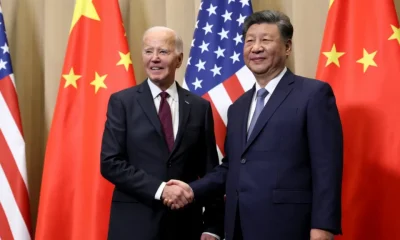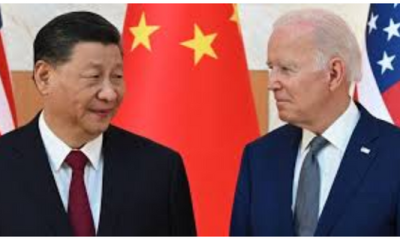News
Taiwan: The Battle Against Mobile Phone Fraud

Telecoms security boss Jeff Kuo says that fighting mobile phone fraud is a constant battle, and that Taiwan is on the front line.
Eko Hot Blog reports that Mr Kuo said, “This is like a miniature of the world, here in Taiwan, where we see all kinds of fraud in advance. We can use this knowledge to protect other countries, because we can see what is going to happen first.”
EDITOR’S PICKS
-
Biden Calls Putin’s Actions In Ukraine “Sick”
-
US Approves $380 Million Missile Sale To Finland
-
Former VC Of Federal University Gusau Sentenced To 35 Years
Mr Kuo is boss of Taiwanese firm Gogolook, which owns Whoscall, one of the most popular spam blocking apps on the island, and across East Asia in general.
It says its artificial intelligence powered software constantly trawls more than 1.6 billion telephone numbers, both Taiwanese ones, and also ones from across Asia and other parts of the world, to block messages and calls from likely fraudsters.
Working with Taiwan’s Criminal Investigation Bureau’s (CIB’s) “195 Anti-Fraud Program”, Whoscall blocked more than 122 million scam messages last year in Taiwan alone.
But why is Taiwan such a hotbed for telecoms fraud? Mr Kuo says the island’s small population of 23.5 million makes it a prefect “practice ground” for organised criminals, both Taiwanese gangs and those from mainland China and elsewhere. They try out a new phone scam in Taiwan, and if it works there then they can expand it out across Asia and then globally.
“[For example], we provide Apple with a lot of evidence… until they realise there is a serious problem,” says Mr Kuo. “A problem that is not only going to spread out in Taiwan, but also in Asia Pacific, and if they don’t take care of it, very soon it will be in Europe and the US.”
CIB telecoms fraud investigator Jean Hsiao Ya-yun said that another reason why so many new scams originate on the island is the very fact that Taiwan is one of Asia’s top manufacturers of high-tech technology. She says this level of technical expertise is shared by Taiwanese scammers.
Ms Hsiao adds that the coronavirus pandemic was a boom time for scammers as millions of people were stuck at home, and, therefore, more reliant upon their phones.
“And the Taiwan stock market was very high at the time, so many people earned a lot of money,” she says, adding that this led to a big rise in investment scams.
“Scammers would [for example] give advice on app pages, or they would start a chat group saying that they can tell you when a stock is going to rise, and they can share this intel if you join their group.”
The scammers would then ask for money for the information. Other such investment scams would see people receiving phone message from friendly strangers offering loans at very low rates.
Such is the extent of the criminal networks behind the scamming that some Taiwanese gangs have opened up operations overseas. Ms Hsiao points to one case from 2020 when 92 Taiwanese were arrested in Montenegro.
In other cases, Taiwanese people are lured overseas to countries such as Cambodia under the false promise of high wages. There they are forced to work against their will as telephone fraudsters.
Mr Kuo admits that there is a “weapons race” between anti-fraud firms like his, and the fraudsters. And while Whoscall and similar apps block millions of messages and phone calls, some still get through.
Anyone who has lived in Taiwan, regardless of age or nationality, is familiar with one method used by fraudsters – burst dialling. Answering an unknown number leads to you hearing a brief dialling sound, and then a pre-recorded message starts playing.
These calls are made by auto-dial systems capable of making hundreds a minute. It’s an effective way for the fraudsters to find the working numbers of people who are prepared to answer their phone despite not knowing who is ringing them.
Taiwanese cyber security expert TonTon Huang says that once such a person has been found, scammers call back.
“If [they find] the number is used by someone, they will sell the active phone data, or tell you that you need to pay a loan, insurance payment, or remit money,” he says. “The most common one seems to be about instalment payments, like you shopped online and you need to pay in instalments or something.”
While scammers are often looking for older people who might not be familiar with technology or keep up with scam trends, the CIB’s Ms Hsiao says they still dupe plenty of young adults as well.
Earlier this year, a 20-something Taiwanese YouTuber Edison Lin posted a video on the platform in which he emotionally revealed that he had been a victim of telephone fraud.
He had been conned out of $13,000 [£12,600] by two fraudsters working together.
Mr Lin said it happened after he was called by someone pretending to an employee of a restaurant he had visited a few months earlier. The man told him that he had accidently been overcharged by $380, and that he would be offered assistance to get the money back.
After Mr Lin had ended that call he was soon telephoned again, this time by the other fraudster pretending to from his bank.
“When the [fake] clerk from E.Sun Bank called, he knew the whole story, he told me how to get compensation from E.Sun,” Mr Lin said in his video. “His professionalism made me think he was really a bank clerk.
“Before long we were talking back and forth for half an hour… and I noticed one of them was transferring [my] money… I still haven’t paid off the debt.”
Prof Sandra Wachter, a senior research fellow in AI at Oxford University, is a global expert on the use of AI software systems.
She says AI can be an effective tool in defending against telecoms and other tech-based fraud, but that the general public also needs to be better educated about the risks.
Technology is being used to scale-up fraud attempts… it allows scammers to cast a wider net and work more efficiently,” she says. “At the same time, some people might be more gullible and vulnerable to deceit because texting or calls seem legitimate, especially if executed in convincing and sophisticated ways.
“Since fraud is scaling up, the strategy to combat these attempts must too scale up and so it makes sense to deploy AI software for this purpose.”
“The question is how effective these attempts are, and if we will be able to fully stop this behaviour? And the answer is, probably not, but we can curb it temporarily. Digital literacy and education can help people not to fall into the trap. AI can help to detect these scams and intervene.”
FURTHER READING
-
Musician Jake Flint Dies Just Hours After His Wedding
-
India Diaspora Remits Record Breaking $100 Billion- World Bank
-
San Francisco To Allow Police Use Killer Robots
Back at spam-blocking app Whoscall, Jeff Kuo agrees, saying fighting fraudsters “may be never-ending, but so is our determination to sharpen our skills and stand up”.
Source: BBC
Click here to watch video of the week:
Advertise or Publish a Story on EkoHot Blog:
Kindly contact us at [email protected]. Breaking stories should be sent to the above email and substantiated with pictorial evidence.
Citizen journalists will receive a token as data incentive.
Call or Whatsapp: 0803 561 7233, 0703 414 5611














